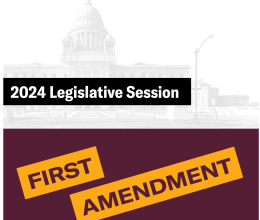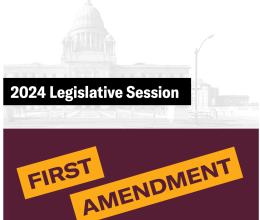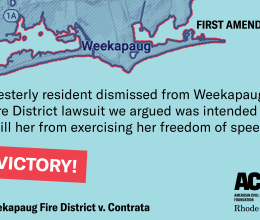By Dan Kennedy
A New Hampshire legislator who sponsored a bill making it a crime for voters to post “ballot selfies” on social media. A Massachusetts district attorney who told members of Congress that online privacy measures would only serve to protect terrorists and sexual deviants. A Maine principal who ordered students to remove a #blacklivesmatter poster.
These are among the winners of the 2015 New England Muzzle Awards, an annual round-up of outrages against free speech that I’ve been writing since 1998. (Noted civil-liberties lawyer Harvey Silverglate compiles a separate list of Campus Muzzles.) The Fourth of July feature was published until recently by the late, lamented Boston Phoenix and its sister papers in Providence, Rhode Island, and Portland, Maine. It is now hosted by WGBH News.
The 2015 awards come amid what can only be described as a crisis in transparency on Beacon Hill and throughout Massachusetts. The state’s public-records law has long been recognized as among the weakest in the country. Several years ago the State Integrity Project gave Massachusetts an “F” for its miserable record of providing access to public information. During the past year, the abuses enabled by the state’s lack of transparency burst into the public consciousness.
Take, for instance, a Boston Globe report from this past March in which we learned that Secretary of State William Galvin’s office had exempted some police records from the law — including the names of officers charged with drunken driving and other serious crimes.
Or take the testimony of Tom Duggan, publisher of the Valley Patriot in North Andover, who told a legislative committee looking into possible reforms that the city of Lawrence refused to release records even after officials had admitted they were public and Duggan had paid a $61.81 fee.
“We were told by the former mayor of Lawrence, Willie Lantigua, that he wasn’t even going to make the effort to look for public records because there was no penalty for refusing,” Duggan said, according to an account in his newspaper. The records were finally turned over when a new mayor, Dan Rivera, took office.
The fate of legislation aimed at strengthening the law by reducing fees, putting many records online, and establishing penalties for noncompliance (including the imposition of attorney’s fees) was undetermined as this year’s Muzzles were being wrapped up. Clearly, though, significant changes are needed.
The Muzzle Awards themselves single out acts of censorship and attacks on free speech. Among this year’s winners, for instance, is President Barack Obama, who has ignored pleas by U.S. Representatives Stephen Lynch and Michael Capuano of Massachusetts to release 28 pages of a secret report that may show a foreign government — Saudi Arabia, according to some accounts — helped fund the 9/11 terrorist attacks.
In years past we’ve criticized U.S. Attorney Carmen Ortiz for her overzealous prosecution of the young Internet visionary Aaron Swartz, which may have contributed to his suicide. Ortiz, by the way, is a three-time winner; see this and this.
At the heart of the Muzzles is a simple but powerful idea: “Congress” — and all levels of government, thanks to the 14th Amendment — “shall make no law … abridging the freedom of speech, or of the press.”
It’s an idea that all too often is honored in the abstract but set aside as an inconvenience when confronted with unpopular or controversial speech.
Click here for the 2015 New England Muzzle Awards.
Dan Kennedy is an associate professor of journalism at Northeastern University and the author of the blog Media Nation.




